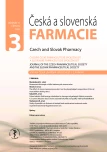-
Medical journals
- Career
Metronomic therapy in the treatment of cancer
Authors: Dana Mazánková; Veronika Bárková; Pavel Mazánek
Published in: Čes. slov. Farm., 2022; 71, 91-97
Category: Review Articles
doi: https://doi.org/https://doi.org/10.5817/CSF2022-3-91Overview
Metronomic therapy is a therapeutic method in selected oncological diseases, using long-term administration of low doses of drugs with direct or indirect antitumor effect. In addition, to direct cytotoxic eradication of tumor cells, metronomic therapy can very strongly affect the tumor microenvironment; it also has an immunomodulatory and antiangiogenic effect. Its minimal toxic profile allows for use in patients with severe organ dysfunctions and directly impacts the quality of life and social inclusion of oncological patients.
Keywords:
toxicity – resistance – metronomic therapy – antiangiogenic effect – immunomodulatory effect
Sources
1. Scharovsky O. G., Mainetti L., Rozados V. Metronomic chemotherapy: changing the paradigm that more is better. Current Oncol. 2009; 16(2), 7–15. doi: 10.3747/ co.v16i2.420. ISSN 1198-0052
2. Hanah D., Bergers G., Bergsland E. Less is more, regularly: metronomic dosing of cytotoxic drugs can target tumor angiogenesis in mice. J. Clin. Investig. 2000; 105(8), 1045–1047. doi: 10.1172/JCI9872. ISSN 0021-9738.
3. Browder T., Butterfield C. E., Brigit M., Shi B., Marshall B., O’Reilly M. S., Folkman J. Antiangiogenic scheduling of chemotherapy improves efficacy against experimental drug-resistant cancer. Cancer Res. 2000; 60(7), 1878–1886.
4. Kareva I., Waxman D. J., Klement G. L. Metronomic chemotherapy: An attractive alternative to maximum tolerated dose therapy that can activate anti-tumor immunity and minimize therapeutic resistance. Cancer Lett. 2015; 358(2), 100–106. doi: 10.1016/j.canlet.2014.12.039
5. Maiti R. Metronomic chemotherapy. J. Pharmacol. Pharmacotherapeutics 2014; 5(3), 186–192. doi: 10.4103/0976-500X.136098. ISSN 0976-500X.
6. Pramanik R., Bakhshi S. Metronomic therapy in pediatric oncology: A snapshot. Pediat. Blood and Cancer 2019; 66(9), 1–12. doi: 10.1002/pbc.27811.
7. Bronišová D., Múdry P., Štěrba J., Bajčiová V., Valík D., Dubská L., Mazánek P., Lokaj P., Zitterbart K. Metronomická léčba v onkologii jako nová léčebná metoda. Onkologie 2009; 3(4), 227–229.
8. Klener P. Angiogeneze a nádorová onemocnění. Remedia 2002; 12(1), 2–8.
9. Folkman J. Tumor angiogenesis: therapeutic implications. NEJM 1971; 285(21), 1182–1186. doi: 10.1056/ NEJM197111182852108
10. Chen H., Herndon M. E., Lawler J. The cell biology of thrombospondin-1. Matrix biology: journal of the International Society for Matrix Biol. 2000; 19(7), 597 – 614. doi: 10.1016/s0945-053x(00)00107-4. ISSN 0945 - 053X
11. de Fraipont F., Nicholson A. C., Feige J. J., Van Meir E. G. Thrombospondins and tumor angiogenesis. Trends Mol. Med. 2001; 7(9), 401–407. doi: 10.1016/s1471 - 4914(01)02102-5
12. Lawler J. Thrombospondin-1 as an Endogenous Inhibitor of Angiogenesis and Tumor Growth. J. Cell. Mol. Med. 2002; 6 (1), 1–12. doi: 10.1111/j.1582-4934.2002. tb00307.x
13. Bocci G., Francia G., Man S., Lawler J., Kerbler R. S. Thrombospondin 1, a mediator of the antiangiogenic effects of low-dose metronomic chemotherapy. PNAS 2003; 100(22), 12917–12922. doi: 10.1073/ pnas.2135406100
14. Bertolini F., Paul S., Mancuso P., Monestiroli S., Gobbi A., Shaked Y., Kerbel R. S. Maximum tolerable dose and low-dose metronomic chemotherapy have opposite effects on the mobilization and viability of circulating endothelial progenitor cells. Cancer Res. 2003; 63(15), 4342–4346.
15. Asahara T., Takahashi T., Masuda H., Kalka C., Chen D., Iwaguro H., Inai Y., Silver M., Iner J. M. VEGF contributes to postnatal neovascularization by mobilizing bone marrow-derived endothelial progenitor cells. EMBO J. 1999; 18(14), 3964–3972. doi: 10.1093/emboj/ 18.14.3964
16. Kerbel R. S. Inhibition of tumor angiogenesis as a strategy to circumvent acquired resistance to anti-cancer therapeutic agents. Bioassays 1991; 13(1), 31–36. doi: 10.1002/bies.950130106
17. Riesco-Martinez M., Parra K., Saluja R., Francia G., Emmenegger U. Resistance to metronomic chemotherapy and ways to overcome it. Cancer Lett. 2017; 400, 311–318. doi: 10.1016/j.canlet.2017.02.027
18. Shu-Ting P., Zhi-Ling L., Zhi-Xu H., Jia-Xuan Q., Shu - -Feng Z. Molecular mechanisms for tumour resistance to chemotherapy. Clin. Exp. Pharmacol. Physiol. 2016; 43(8), 723–737. doi: 10.1111/1440-1681.12581
19. Mross K., Steinbild S. Metronomic anti-cancer therapy – an ongoing treatment option for advanced cancer patients. J. Cancer Therap. Res. 2012; 1(1). doi: 10.7243/2049 - 7962-1-32
20. Koki A. T., Masferrer J. L. Celecoxib: A Specific COX – 2 Inhibitor With Anticancer Properties. Cancer Control 2002; 9(2), 28–35. doi: 10.1177/107327480200902S04
21. Shim J. S., Matsui Y., Bhat S., Nacev B. A., Xu J., Bhang H. C., Dhara S., Han K. Ch., Chong C. R., Pomper M. G., SO A., Liu J. O. Effect of Nitroxoline on Angiogenesis and Growth of Human Bladder Cancer. JNCI 2010; 102(24), 1855–1873. doi: 10.1093/jnci/djq457
22. Shichiri M., Fukai N., Kono Y., Tanaka Y. Rifampicin as an Oral Angiogenesis Inhibitor Targeting Hepatic Cancers. Cancer Res. 2009; 69(11), 4760–4768. doi: 10.1158/0008 - 5472.CAN-08-3417
Labels
Pharmacy Clinical pharmacology
Article was published inCzech and Slovak Pharmacy

2022 Issue 3-
All articles in this issue
- Metronomic therapy in the treatment of cancer
- RNDr. PhMr. Ernest Alt – in memoriam
- Za prof. Ing. Petrom Kovácsom, DrSc. – in memoriam
- Pulsed electric field energy calculation to damage red galangal (Alpinia purpurata, K. Scumm) rhizome slices and its essential oil yield and quality with hydrodistillation
- Study of possible sex features of ramipril and candesartan treatment under experimental arterial hypertension in rats
- The effect of Aronia melanocarpa extract on the phospholipid composition of the rat myocardium during stress
- Czech and Slovak Pharmacy
- Journal archive
- Current issue
- Online only
- About the journal
Most read in this issue- Metronomic therapy in the treatment of cancer
- The effect of Aronia melanocarpa extract on the phospholipid composition of the rat myocardium during stress
- Study of possible sex features of ramipril and candesartan treatment under experimental arterial hypertension in rats
- Pulsed electric field energy calculation to damage red galangal (Alpinia purpurata, K. Scumm) rhizome slices and its essential oil yield and quality with hydrodistillation
Login#ADS_BOTTOM_SCRIPTS#Forgotten passwordEnter the email address that you registered with. We will send you instructions on how to set a new password.
- Career

